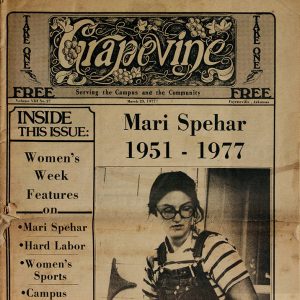calsfoundation@cals.org
Yellowhammer
Yellowhammer was a women’s communal-living farm in Madison County in the 1970s, representative of women’s land groups that existed in northwest Arkansas at that time.
The back-to-the-land movement and the women’s movement came together in the early to mid-1970s to create the women’s land movement, self- or nearly self-sufficient land communities organized by and for women. The women’s land movement had many roots, including the hippie and anti-war movements, environmentalism, and feminism, many of which were interwoven.
In 1970, founders Trella Laughlin and Patricia Jackson were in Austin, Texas, playing in an “all-girls band,” learning about solar energy, sharing resources and living spaces, and protesting the Vietnam War. Soon afterward, they moved with friends to land in rural Pope County, nicknamed the “Doobie Plantation,” where they lived communally and practiced organic farming. The women soon learned about the negative health and environmental effects from the spraying of 2,4,5-T, a derivative of Agent Orange, a defoliate used in Vietnam that was being employed locally. In this context, the Doobie men, afraid of the women’s outspokenness (speaking out and writing letters about the spraying), asked them to leave.
The women then moved to 600 acres of land in rural Van Buren County, where they welcomed visitors who had heard about the “The Women’s Experiential Project” from an article in Ms. magazine. Laughlin and Linda Evans traveled all over northwest Arkansas, sometimes on horseback, speaking to church, civic, and land groups about the dangers of 2,4,5-T. They obtained an injunction against its spraying, but the local sheriff disregarded it. The women experienced threats against them and the burning of their tents. They then left the land.
Some of the women—Laurel Brooke, Nedra Wood, Diane Goss, Marta Goldberg, and Evans—rode the back roads of central and northwest Arkansas on horseback, sharing their knowledge of the earth and living off the land. Laughlin and Jackson moved on to Eureka Springs (Carroll County) to work for Barbara Scott at the recently purchased New Orleans Hotel. They then moved to Fayetteville (Washington County) and shared the collective Mulberry House with their “faery brothers” (gay men). However, they still yearned for an open space for women not based on private ownership or how much money a woman had. In 1974, they put out the word in Ms. magazine, Lesbian Connection, and even the Fayetteville alternative paper Grapevine. Through an inheritance, Laughlin and Jackson bought eighty acres of land in Madison County. Since the Yellowhammer woodpecker was everywhere, they called the experiment “Yellowhammer Farm.”
Women who had heard about the concept of a women-only living space through word of mouth and literature came to live there from 1974 to 1980. Laughlin and Jackson were joined by Carolyn Ritter, Miriam “Furch” Strauss (who played the stock market with Laughlin to help finance Yellowhammer), and others. Visitors abounded, but most did not want to live so collectively. Money was tight, and tempers flared. Working-class women were becoming aware of their class oppression, the lack of access to resources, and the prejudices upper- and middle-class women held against them and their leadership. Most of the women were white; seldom was a woman of color involved.
The ownership of land never got resolved, although research was done into the possibility of creating a land trust. Basically, the hard work and living conditions, including the lack of running water and electricity, exerted a toll on the Yellowhammer women. Laughlin stayed on with Carolyn Gregory until 1980 to clean up the land, recycle, and sell the property. She no longer believed in “separatism”; rather, she wanted to participate in a worldwide struggle against imperialism. She once said, “We need, each of us, to work on our issues, for sure; but we also need each other to create a revolutionary world of real change.”
Laughlin sold Yellowhammer, distributed the money to each of the main members, and gave the rest away. The women went their separate ways. Laughlin moved back to Austin, Texas, and created a feminist television series, and Jackson moved to San Francisco, California, to work for lesbian and gay issues. The “Horse Women” had never agreed to a “women-only” space, and most had earlier moved back to cities to continue progressive work.
For additional information:
Lord, Allyn, and Anna M. Zajicek. The History of the Contemporary Grassroots Women’s Movement in Northwest Arkansas, 1970–2000. Fayetteville, AR: 2000.
Zajicek, Anna M., Allyn Lord, and Lori Holyfield.“The Emergence and First Years of a Grassroots Women’s Movement in Northwest Arkansas, 1970–1980.” Arkansas Historical Quarterly 62 (Summer 2003):153–181.
Anna Zajicek
University of Arkansas, Fayetteville
Allyn Lord
Shiloh Museum of Ozark History






Update on former Yellowhammer residents, 02/11/2021:
Laurel Wise Brooke died in Provincetown.
Nedra M. Wood died in Texas.
Patricia Jackson lives in San Francisco, CA.
“Furch” is perhaps in NY.
Trella Laughlin is married to Marie Howard and lives in Eureka Springs, AR.
We all learned from YELLOWHAMMER.
What we learned is dependent on each woman.
I, Trella, hold sweet memories and cherish the struggle although it took me a LONG TIME to understand and grow. I MISS US ALL.